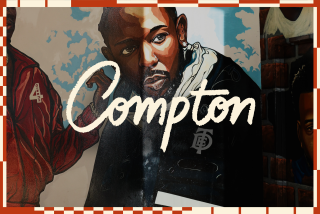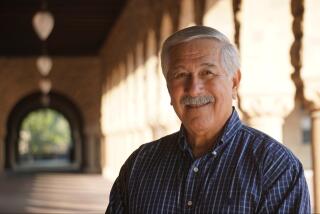Coffeehouseâs Beneficial Jolt
The opening of a Starbucks in Compton last month -- the product of a joint venture between the ubiquitous coffee giant and Magic Johnsonâs Johnson Development Corp. -- is far more than another attempt to reach âurban marketsâ in this nationâs poorest minority communities. It might very well be a blueprint for a new way of thinking about inner-city revitalization, one that emphasizes the importance of cultivating civic discourse as much as it does job growth.
The Compton outlet is one of nearly 70 âurban coffee opportunitiesâ the partnership has opened since 1998. They aim to serve as âanchor businessesâ in the sagging commercial districts of many of the nationâs densely populated, predominantly black neighborhoods. They also provide desperately needed jobs for the young and unemployed in those communities.
And unlike other large corporate investors in inner-city markets -- Wal-Mart, for example -- Starbucks offers something more than a meager salary: Even part-time employees receive comprehensive healthcare packages. For the legions of employees who come from homes where health insurance is an unaffordable luxury, this benefit is more than just whipped cream on a latte; it is essential.
But the coffee shop is also important for the deceptively simple reason that it is a safe, quasi-public space for people to talk. At its best, it is not simply a place for the exchange of commerce, but also a place for the exchange of ideas. In Southern California, the reckless underdevelopment of public space and overuse of private transportation have left us with a disengaged citizenry, but at least most of us live in safe neighborhoods. In parts of Compton and vast swaths of South Los Angeles, however, civic isolation is compounded by merciless gang violence. There, with some notable exceptions, public playgrounds and parks are not really public. They have often been monopolized by gangbangers who define and defend those places as âtheirâ private territory, which, for all intents and purposes, it is.
There are, to be sure, places where civically minded people in broader South Los Angeles can meet, talk and share ideas: libraries, bookstores, markets, bars, churches, fraternal organizations and, yes, barbershops. But there are not enough such places. And few seem as well suited to fostering intimate intellectual and emotional engagement as the well-lighted, cushion-ensconced interior, or the Astroturf-lined patio, of the new coffeehouse.
Given the problems that plague cities like Compton -- savage gang violence, struggling schools, high unemployment rates and the rising economic and political competition between its historically black population and the new Latino majority -- the lack of public space might seem frivolous. It is not, and here is why: There is a well-documented crisis in values among youths in our poorest communities. But this crisis cannot be entirely blamed on bad parenting. Nor can it be blamed solely on institutional racism and dwindling economic opportunities.
What most people are not sufficiently appreciative of is the profound importance of physical space in the transmission of the values in question. Put simply, children and adults in poor neighborhoods need more safe places to go where civil exchanges and intellectual discourse are fostered. We should applaud attempts to create public spaces where those values are, well, valued.
Josh Sides, an assistant professor of history at Cal Poly Pomona, is the author of âL.A. City Limits: African American Los Angeles From the Great Depression to the Presentâ (University of California Press, 2004).
More to Read
Inside the business of entertainment
The Wide Shot brings you news, analysis and insights on everything from streaming wars to production â and what it all means for the future.
You may occasionally receive promotional content from the Los Angeles Times.










